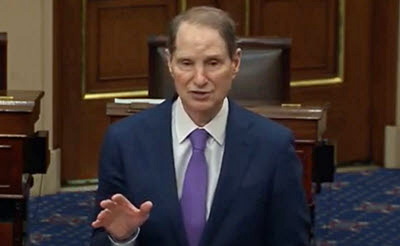
The Roundtable and 12 other national real estate organizations wrote to congressional tax writers on Dec. 8 in strong support of the Workforce Housing Tax Credit (WHTC) Act (S. 3436), which would create a new tax incentive aimed at increasing the supply of moderate-income rental housing. The Senate’s top tax writer, Finance Committee Chair Ron Wyden (D-OR), above, said this week that there is a “real window of opportunity” to pass bipartisan housing legislation in the coming months that could be folded into a possible 2024 tax package. (WHTC bill summary, Dec. 7 | Coalition letter, Dec. 8 | Wyden’s Senate floor remarks, Dec. 12 | Tax Notes, Dec. 13)
Affordable Housing Tax Credits
- Sen. Wyden told Tax Notes that housing tax credits “will be part of the discussions we’ll have to have” with House Ways and Means Chairman Jason Smith (R-MO) as they discuss elements for a possible tax package in the new year.
- The Senate Finance Committee Chairman also commented on the Senate floor about his introduction last week of the WHTC Act (S. 3436) with Sen. Dan Sullivan (R-AL), Rep. Jimmy Panetta (D-CA) and Rep. Mike Carey (R-OH). “Our bipartisan proposal, based largely on the success of the Low Income Housing Tax Credit (LIHTC) would help spur a juggernaut of new housing construction,” Wyden said. (Video of floor remarks | Roundtable Weekly, Dec. 8)
- Led by the National Multifamily Housing Council, the Dec. 8 industry coalition letter stated, “We believe that the Workforce Housing Tax Credit Act will only serve to complement the LIHTC.” The organizations emphasized that the WHTC would spur the development of housing targeted to renter households who face affordability challenges yet are ineligible for federal subsidies.
WHTC & LIHTC

- The WHTC would build on the successful LIHTC by enabling state housing agencies to issue similar tax credits to developers for the construction or rehabilitation of income-capped rental housing. (One-page Senate Finance Committee summary and WHTC bill text)
- WHTC credits could be used to build affordable housing for tenants between 60% and 100% of the area median income, or transferred to the State’s LIHTC allocation for housing aimed at lower-income tenants (generally below 60% of area median income). (Congressional Research Service summary of the LIHTC, April 26)
- Roundtable President and CEO Jeffrey DeBoer stated, “Tax policy should support and encourage private sector investment that boosts the supply of affordable and workforce housing. The Workforce Housing Tax Credit Act would build on time-tested tax incentives like the low-income housing tax credit and further facilitate the conversion of underutilized, existing buildings to housing. We welcome this positive step forward for our nation’s housing supply.” (Roundtable Weekly, Dec. 8)
- In the House this week, Rep. Jimmy Gomez, D-CA), reintroduced the Rent Relief Act of 2023, which would create a new tax credit for renters of a personal residence to cover part of the gap between 30 percent of their income and actual rent. Tax Notes, Dec. 13)
Rep. Gomez told Tax Notes this week that House tax writers hope to include the rent relief bill, along with Gomez’ Revitalizing Downtowns Act (H.R. 419) in bipartisan discussions about a potential tax package. H.R. 419 would provide an investment tax credit for 20 percent of the cost of converting office buildings to other uses. (Rep. Gomez news releases, July 28 and Dec. 12 | news release, Dec. 12 | Roundtable Weekly, Aug. 11)
# # #